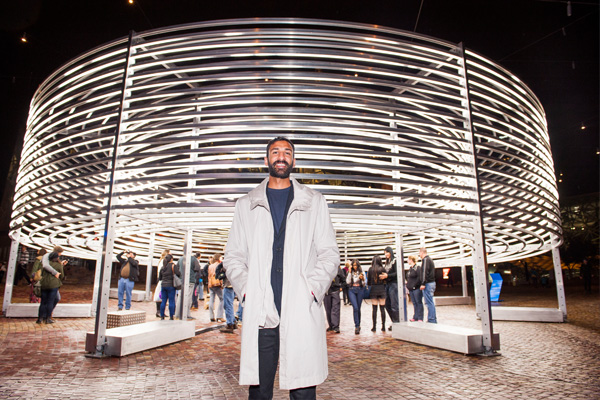
This year’s edition of The Light in Winter at Federation Square sees London architect, Asif Khan, create an intuitive and interactive lighting installation that can sense you and engage with you through space and light. Alice Blackwood reports.
The inimitable Jon Faine described it as a donut, on ABC radio 774 Melbourne earlier this week, and to some extent Asif Khan’s The Light in Winter commission, Radiant Lines (pictured above), for Federation Square does appear like that.
Story continues below advertisement
It’s a fairly incredible installation, sculptural in appearance, consisting of 1.5km of aluminium extrusion coiled into enormous rings. This permeable ‘donut’ is a play on ‘not-form’, it’s quite spatial and extremely sensitive to human presence.
“Around dusk… every day, these LED lights within it start to flicker and blink on,” Khan explains in his radio interview with Faine.
Story continues below advertisement
“As you enter Federation Square you’re picked up by the sensor at the centre of the installation… it starts to display your presence as an orbit of light.”
This sense of the intelligent, interactive and technologically empowered is a common theme among Khan’s architectural work, which manifests as both installations and projects the world over.
Story continues below advertisement
When you think about architecture, says Khan, it tends to be one-off. “Custom, large-scale bespoke pieces of art,” he says. “Nothing is repeated.” By comparison, mass-producible products, like an iPhone for example, allow for new methods of making and the sharing of this. By comparison, technological advances in architecture can be quite slow.
Coca-Cola Beatbox by Asif Khan and Pernilla Ohrstedt
That’s why Khan, through his projects, endeavours to learn from the ways in which associated industries (including science, telecommunications, IT, nano-technology, engineering), are learning. “They share a lot in common with architecture but have the difference of being produced en mass. We’re finding which bits can be slotted into our architectural practice.”
Some of Khan’s most recent and best known work has been undertaken with major enterprises such as Coca Cola and the Sochi Winter Olympics. The latter resulted in his groundbreaking MegaFaces installation (below) – a cross platform experience that engaged digital, sculptural and architecture. Here, 11,000 actuators formed a kinetic façade which could transform in three dimension to recreate faces of visitors to the building.
Among the mean reactions from visitors was the question, “Is it real?”
To elicit such real wonder and surprise from people was, for Khan and his studio, confirmation that they had succeeded in their purpose.
“It’s about tapping into the way [humans] work,” says Khan. “In architecture traditionally we talk about weightiness and loftiness, shadow, light, but those are [simply] modulators of our own perception of space. They are just like lenses and force a certain way of thinking or feeling or mood.
“In the projects we’re doing, it’s [often about exploiting a feeling we like]. That’s what makes a project successful – how a material feels, the journey, the light quality, the time or even the sense of lack of time….
Parhelia for Swarovski by Asif Khan
“These things are the ingredients of architecture, and technology now feels available to employ and it feels like if we’re not employing it, we’re ignoring [all the things that are happening around us].”
You can experience Asif Khan’s Radiant Lines first-hand at Federation Square, as part of Light in Winter, until 22 June. Ideal times to visit are 5.30pm until late.
For more information click here.
To listen to Asif Khan’s interview on ABC radio 774 Melbourne, click here.
Asif Khan
asif-khan.com
Federation Square
fedsquare.com